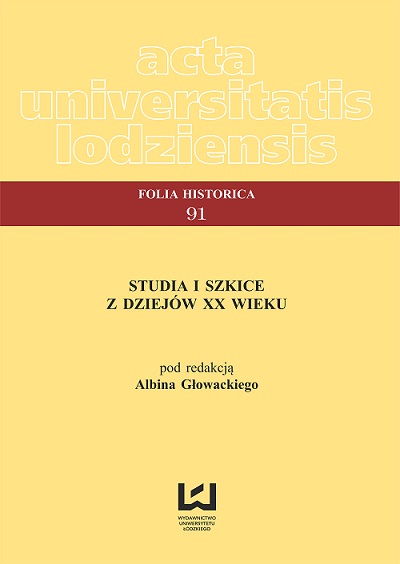The resistance issues in occupied Poland in broadcasts of Tadeusz Kosciuszko’s radio station
DOI:
https://doi.org/10.18778/0208-6050.91.03Abstract
On June 22nd 1941 the IIIrd Reich attacked USSR. The outcome of military warfare on Eastern Front, unfavourable for the Red Army, caused the Communist International (CI) structures, operating in the Soviet country since 1919, to move in October 1941 from Moscow to Ufa and Kuybyshev.
After the German aggression a need for intensive propaganda works came into existence. Within the Executive Committee’s (EC) apparatus there was, among others, Press and Radio Broadcasting Department supervised by Bedřich Geminder during 1941–1943 (pseudonym: G. Friedrich).
Between 1941–1942 there were a general radio office and 16 secret national stations, which in 1943 were incorporated into the Department.
After the dissolvement of CI, spring 1943, the radio stations were affiliated to a secret Institute of Science and Research no. 205 (the former Press and Radio Department of ECCI) operating in a newly formed International Information Department of Central Committee the All-Union Communist Party (Bolsheviks).
Among 16 offices that CI brought to life, there was a station under the name of Tadeusz Kościuszko, broadcasting in Polish language. It started broadcasting in July 1941 and continued up to July 22nd 1944. Its headquarters was situated initially in Moscow, however, after the evacuation of ECCI in October 1941 it broadcasted from Ufa, Bashkiria.
The station touched many issues regarding the war and occupation One of them was the issues of the leftwing resistance movement in occupied Poland. In the station’s news it was indicated which cities or towns were liberated by communist underground Apart from that the office underlined in its announcements that people’s army freed people enslaved by German occupier. The audience was keenly informed that the guerillas were fighting railway infrastructure in order to hinder the arms and ammo, food and new recruits convoys to the Eastern frontline. The broadcast did not skip such issues as liquidation of German occupying authorities’ representatives; raids on the premises where Wehrmacht soldiers spent their free time; or sabotaging the German warfare industry. The aim of the news was not merely informing about the effectiveness of the Communist Resistance, but also encouraging the audience to form new guerilla divisions or joining the already existing ones to engage in warfare.
Downloads
Downloads
Published
How to Cite
Issue
Section
License

This work is licensed under a Creative Commons Attribution-NonCommercial-NoDerivatives 4.0 International License.











